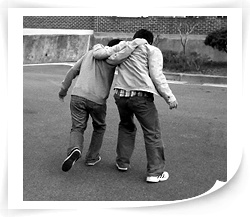Kraus
This chapter mainly describes what kind of person Kraus was in the concentration camps. However, in doing so, I sensed a little harsh tone in Primo Levi’s writing when he was describing Kraus. “I warn him to be careful, but without much hope: he is Hungarian, he understands German badly…” I was curious why Primo Levi described Kraus in such a manner. He was a fellow who worked really hard despite the harsh surroundings, and Primo Levi constantly criticize the hard work of Kraus by saying “He does not yet know that it is better to be beaten, because one does not normally die of blows, but one does of exhaustion…he seems to think that his present situation is like outside, where it is honest and logical to work, as well as being of advantage, because according to what everyone says, the more one works the more one earns and eats.” I think the harsh tone of Primo Levi’s writing probably rooted from his hatred toward Germany soldiers, not Kraus. Primo Levi’s hatred was so deep that whoever benefited Germans was the target of his hatred. Kraus, for instance, was an honest fellow who wholeheartedly worked in the concentration camps, probably not for German’s sake, but it was his personal habit that he worked so hard in any situation given. Although, Primo Levi probably knew that Kraus was not working so hard to gain special recognition for Germans, but his anger blocked Primo Levi from seeing it, and that prejudice built upon him resulted in Primo Levi watching Kraus in pity and degrading attitude.
Primo Levi, however, did not hate him personally, it was the most illogical, and unbearable environment that caused him to view Kraus as silly, poor fellow who could didn’t see the current situation he was in. Primo Levi describes how Kraus must be a good fellow as a civilian “What a good boy Kraus must have been as a civilian: he will not survive very long here…” This quote shocked me because it contradicted the very sayings of my parents that whatever situation I am in, I have to do my best in everything. This again suggests how dreadful the conditions were in concentration camps that even the most logical statement, “the more one works the more one earns and eats” was not options in this camp. Thus, I think I could understand Primo Levi’s view on how we sometimes must work minimal for our survivals.
Sunday, March 11, 2007
Subscribe to:
Post Comments (Atom)

No comments:
Post a Comment